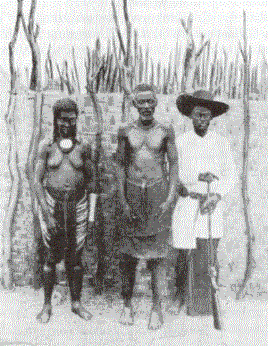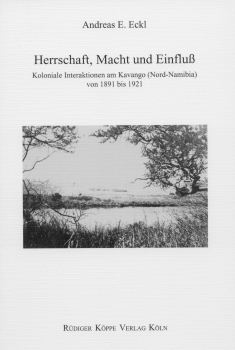



This book examines the early stage of colonial contacts in the Kavango region when the antagonists (German, British and Portuguese, Catholic-German missionaries as well as indigenous rulers of the four Kavango peoples) still met at the same level. At that time they all had the idea to succeed with their own interests against the other participants.
The interactions between the traditional rulers, their dependent peoples, the colonial representatives on both sides of the international boundary between Angola and the later Namibia, and the missionaries were guided by various – competitive and concurrent – expectations and concepts. These changed in the following years because of the duration of the contact and the change of the global political conditions. The First World War had an impact on the situation inspite of the remoteness of the Kavango region.
The main finding interest of this innovative study are the way of acting and the behaviour of every single protagonist. Their individual interests, options and strategies form the background of their competitive endeavour for power, control, and influence. The basis of this work are records in public, ecclesiastical and private archives as well as a systematical evaluation of oral literature, and early notes of missionaries and contemporary European observers.
The author tries to free himself from conventional clichés of the early colonial history. He considers every participant of the colonial situation – and so includes the natives – as an autonomous actor, and gives everyone an individual profile with economical and powerpolitical interests by applying different perspectives. The resulting paradigm leads the reader to new findings and patterns of interpretation.
Under thse links you will find publications by the author and further africanist’s, ethnographical and ethnohistorical studies of southern Africa and of the Kavango region:
Eckl will nicht nur einen weiteren Beitrag zur deutschen Kolonialgeschichtsschreibung leisten, er will mehr. Er will die Interaktionen zwischen europäischen und afrikanischen Eliten beschreiben: die Machtspiele, die Angriffsversuche auf die Späre der Macht und die Abwehrreaktionen einheimischer Herrscher. Seine Studie will ein Teil der afrikanischen Geschichtsschreibung sein. Sein Ziel: Ein Perspektiven-Wechsel von den kolonialisierten Afrikanern als „Opfer“ hin zu selbst bestimmten Akteuren im Kampf um Macht, Herrschaft und Einfluss. Er will sozusagen die afrikanische Innen-Perspektive einnehmen. Ein interessantes, aber gewagtes Unterfangen angesichts der spärlichen indigenen afrikanischen Quellen.
Jens Hüttenberger in Afrikanistik-online, www.afrikanistik-online.de/archiv/2006/300, 1-4
Die Arbeit behandelt eine in der Geschichtsschreibung vernachlässigte Region und ist insofern eine Pionierleistung, weil hier erstmals die komplexen „Interaktionen“ zwischen den regionalen Herrschern und den sich etablierenden Kolonialmächten sowie der Mission untersucht werden.
Gesine Krüger in Periplus, 2006, 251-253
Departing from the perspective of the colonial powers and adopting the one of African interaction Eckl primarily sees his study as a contribution to African historiography.
Ulrich Oberdiek in Anthropological Abstracts, www.anthropology-online.de/Aga06/0067.html, 1
Eckl gelingt es mit seiner detaillierten Untersuchung, neue Erkenntnisse zur Geschichte der Kavango- Region zu vermitteln und somit eine Forschungslücke zur kolonialen Geschichtsschreibung Namibias zu schließen. Indem er darin insbesondere das Verhältnis zwischen Afrikanern und Vertretern der Kolonialmacht erörtert, zeigt er auf, daß die afrikanische Bevölkerung der Kavango-Region der fremden Administration nicht bedurfte, daß sie sich vielmehr selbst zu verwalten vermochte. Damit bestätigt sich einmal mehr das zu anderen ehemals europäischen Überseegebieten beobachtete Phänomen, daß sich die politischen Verhältnisse an der Peripherie einer Kolonie durchaus anders gestalten konnten als im restlichen Teil des jeweiligen Territoriums. Daß dies im sonst so repressiven Deutsch-Südwestafrika sogar bis zum faktischen Ende der deutschen Kolonialherrschaft – und selbst noch eine Zeitlang darüber hinaus – möglich war, dürfte auch heute noch so manchen an der europäischen Überseegeschichte im allgemeinen und an der deutschen Kolonialgeschichte im besonderen Interessierten kaum geläufig sein.
Harald Sippel in Jahrbuch für Europäische Überseegeschichte, 7/2007, 342-344
© 2026 by Rüdiger Köppe Verlag – www.koeppe.de